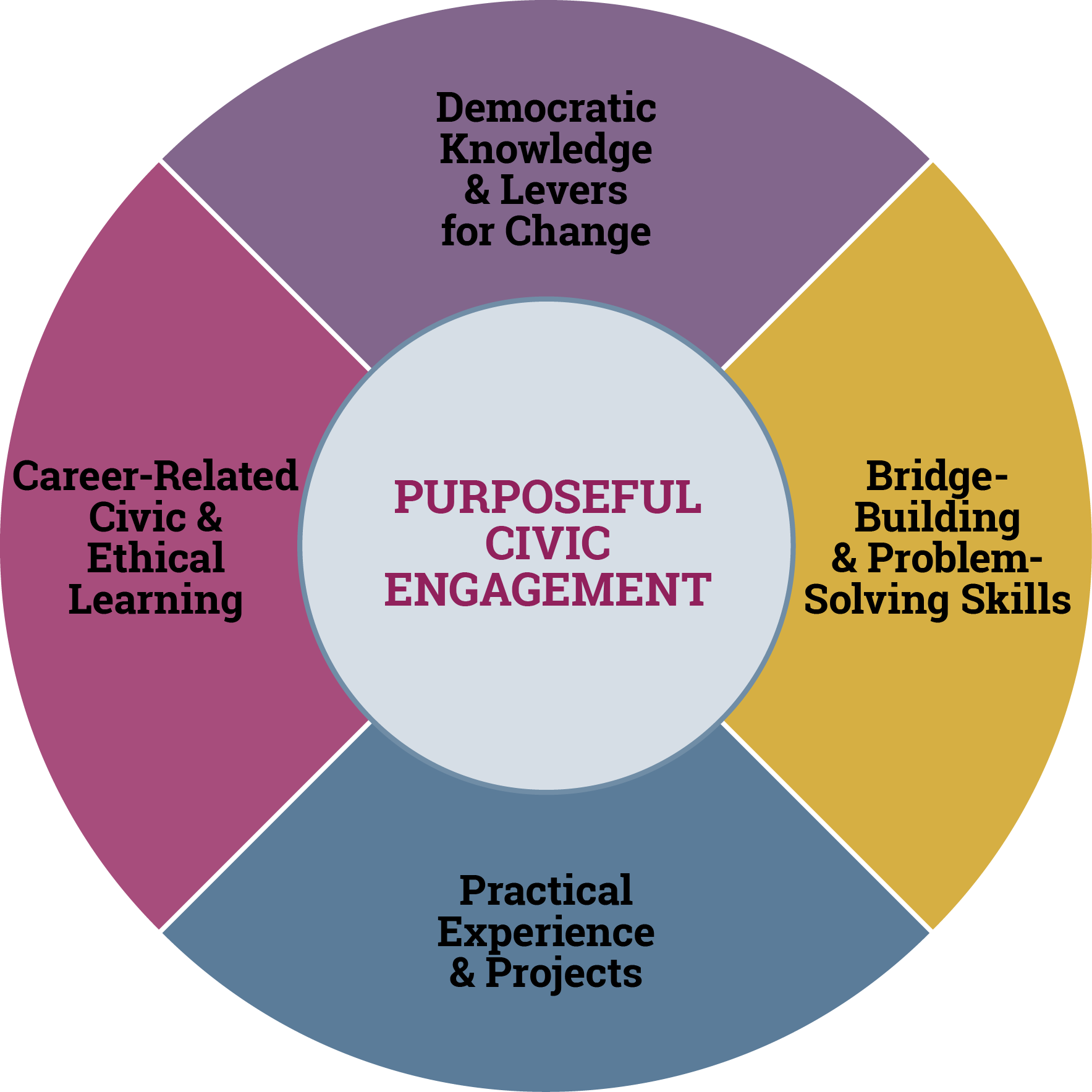What Should Students Gain from Civic and Democracy Engagement in College?
THE CLDE FRAMEWORK FOR COLLEGE CIVIC LEARNING AND DEMOCRACY ENGAGEMENT
Across the United States, a growing number of educators, policy leaders, and citizens are asking how we can better prepare today’s students for their roles and responsibilities in renewing U.S. democracy and securing democracy’s success across the globe.
Strengthening P–12 education in history and civics is part of the answer. But with a majority of Americans now enrolling in postsecondary education — either directly from high school or as working adults — the college curriculum is an equally important context for building purposeful civic engagement and the capacities that a successful democracy needs.
Students develop purposeful civic engagement by reflecting on their own civic identities and experiences, exploring democracy’s development and aspirations, practicing productive dialogue with those who disagree, and examining — both in general and career-related studies and in community-based practical experience —how choices affect individuals and communities.
For 21st-century America, civic learning and democracy engagement also should include explorations of diversity in all its forms. The United States is the world’s most diverse democracy, and today, one of our biggest challenges is creating better ways to solve problems together, across many kinds of difference.
The coalition’s CLDE Framework provides a point of departure for discussion, debate, and decisions at all levels — national, state, and institutional — about ways to revitalize education for democracy for all postsecondary learners and the democracy we share.
DEMOCRATIC KNOWLEDGE & LEVERS FOR CHANGE
Students explore:
★ Key democratic principles and debates about meaning and application
★ Constitutionalism and the political systems that frame democratic governance
★ Founding and freedom texts for the U.S. democratic republic
★ Historical and comparative knowledge of U.S. and global freedom movements
★ Authoritarianism and other anti-democracy movements
★ Civic inquiry and public good questions related to students’ careers
★ Levers for influencing change in civil society and specific career fields
★ Guided reflection on students’ experiences and views of democracy
Where? In general education programs and courses that explore democracy’s development, principles, contestations, and challenges, including movements for policy and societal change, and in students’ majors, including career and technical fields
BRIDGE-BUILDING & PROBLEM-SOLVING SKILLS
Students develop:
★ Communication skills: written, oral, and intergroup dialogue
★ Critical inquiry and evidence-based reasoning
★ Digital, data, and media literacy, including disinformation
★ Productive engagement with diverse views and experiences
★ Problem solving with diverse partners
★ Ethical reasoning about alternative approaches to problems
★ Purpose and agency grounded in a strong sense of identity
Where? Practiced across general education and all majors, including career and technical studies, and in co-curricular and community-based experiences and projects
PRACTICAL EXPERIENCE & PROJECTS
Students help create new solutions through:
★ Individual and group work on public good and justice questions
★ Collaborative service learning projects in courses
★ Community-based problem solving with diverse partners
★ Research projects with and for community or government organizations
★ Public presentation and discussion of project results
★ Guided reflection on their learning from field-based experience and problem solving
Where? Research and/or action projects completed to meet degree requirements in majors, certificates, and/or general education
CAREER-RELATED CIVIC & ETHICAL LEARNING
Students work on:
★ Public policy and public good issues related to chosen or likely careers
★ Levers for influencing policy decisions in their career fields
★ Civility, fairness, and collaborative problem solving in work contexts
★ Career-related ethical principles and standards for practice
★ Civic, ethical, and fairness questions raised through practical problem solving
★ Collaborative reflection — with mentors and peers — on civic, ethical, and fairness issues related to careers
Where? In students’ major fields, including career and technical studies; in career planning programs, curricular or co-curricular; and in practicums and projects required for a degree or certificate
STUDENTS’ PURPOSEFUL CIVIC ENGAGEMENT AND CHOICES FOR THE FUTURE
Through their course-taking, practical experiences working on public good questions, and guided reflection on their own identities, goals, and civic voice, students will make their own decisions about how they want to contribute to the public good beyond college. Some students may work on public good questions related to their professions and/or workplace. Others may become active in local and/or faith communities. Some will choose public service as their career. Many will contribute primarily as engaged and knowledgeable voters.
Whatever their choices for the future, all students should graduate civic ready, democracy ready, and career ready. And they should be deeply conversant with public good questions directly related to their intended careers.
An earlier version of this framework for college civic learning has been revised based on feedback from the field. Please send comments through this form or by email to info@collegeciviclearning.org.

